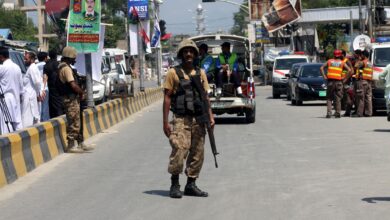
By Shazar Shafqat
Talks, talks, and more talks. The United States appears to be setting up talks on Afghanistan all too frequently, but whether these engagements will work in favor of the U.S. is the question that continues to perplex many strategic thinkers.
In the latest series of dialogues, U.S. Deputy Assistant Secretary of State Alice Wells met with Pakistan’s Army Chief General Qamar Javed Bajwa earlier this month and discussed the situation in Afghanistan. U.S. Secretary of State Mike Pompeo visited last Monday, meeting U.S. and NATO coalition troops. Now, in an unprecedented move, the Trump administration is preparing for direct talks with the Taliban, a move that is likely to backfire and further jeopardize the authority of the government in Kabul. The United States should refrain from taking the bait, and of the repercussions that holding direct talks with the Taliban might have on the overall security situation in Afghanistan.
Last Wednesday, unknown gunmen killed at least 10 people in Jalalabad. At least 15 Afghan National Army soldiers have been killed in recent clashes with the Taliban in Kunduz. On July 7, another insider attack killed 20-year-old U.S. Army Corporal Joseph Maciel who, along with this team, was deployed in Uruzgan Province, advising the local forces there. A second U.S. service member, 32-year-old Sergeant 1st Class Christopher Andrew Celiz, was killed in an attack in Paktiya Province last Thursday.
Insider attacks are on the rise, and the trend isn’t likely to subside. In a column I wrote last year after a similar attack, I said: “NATO and the U.S. troops often find themselves in a quandary. They often find themselves in a constant psychological flux. Taliban seems to take credit for every insider attack carried out on foreign troops but does that mean Afghan forces have been compromised? Either way, it’s bad news for foreign officials in Afghanistan.”
Now that the U.S. policy on Afghanistan is reportedly being reviewed again, how should the United States go about bringing peace and stability in Afghanistan? There are four factors that the Trump administration needs to consider.
First, the administration needs to be aware of the amount of influence the Pakistani establishment can exert over the Afghan Taliban.
While the United States might want Pakistan to do more, it is possible that Pakistan’s ability to convince the Afghan Taliban to shed violence has waned. This is further evidenced by the fact that Afghan Taliban wasn’t able to (or the group didn’t want to) deliver to Pakistan its most-wanted terrorist, Maulana Fazlullah, who had been hiding in Afghanistan in areas the Afghan Taliban have significant hold over, until he was killed in a U.S. airstrike in June.
Second, the U.S. needs to consider the strategic calculation in the Af-Pak region. The Afghan Taliban have never attacked or threatened to attack the Pakistani State, and it’s obvious that the Pakistani establishment doesn’t consider them a threat. However, it boils down to whether Pakistan considers the Afghan Taliban a potential asset or not.
Considering how recent events have panned out, it appears unlikely that Pakistan and the Afghan Taliban are working as close allies at this time. Although their interests might converge, it’s at best a “you scratch my back, I’ll scratch yours,” sort of a relationship. The United States need to gauge the strength of this relationship, and once the administration is sure about it, then it could help outline the next moves in Afghanistan.
It is apparent that Pakistan would want to hold on to the Afghan Taliban just to ensure India doesn’t get a stronghold in the country. With parliamentary elections just around the corner in Kabul, Pakistan might want the Afghan Taliban to get a fair chunk of the government to keep the Indian threat at bay.
If the United States could alleviate Pakistan’s concerns regarding an Indian presence in Afghanistan, and assuming mutual trust and harmony between Washington and Islamabad last long enough, then the United States could pressure Pakistan to do all it can to bring the Afghan Taliban to the negotiating table. This offers a realistic opportunity for the United States to achieve strategic gains in Afghanistan.
Third, the timing of any peace talks is critical. The United States needs to ensure it doesn’t offer peace talks at a time when the insurgents are able to strike at will. When that’s the case, any peace initiatives are doomed to fail. When the insurgents are on the ascendancy, it isn’t strategically apt for them to agree to peace talks. Why would they?
In the current climate, the Afghan government is only going to concede much without getting anything in return. The Taliban don’t need to win. As long as they continue to avoid losing, both tactically and strategically, they wouldn’t need to pay heed to peace talks. That’s a conundrum the United States needs to navigate through.
Fourth, large-scale conventional attacks in Afghanistan just wouldn’t serve the purpose. It’s a low-intensity conflict, and this is why the United States needs to employ psyops more than anything else. Intelligence-based operations instead of heavy artillery are going to help U.S. forces decimate the insurgents from within, a situation direly needed to ensure the Afghan Taliban get serious about the prospects of peace talks.
Before the parliamentary elections in Afghanistan, scheduled for October 20, the Afghan Taliban are likely to go by the script they use most often. The group is likely to try to gain considerable political space by launching deadly strikes across the country. The more they push forward, the more the Afghan government concedes.
It is now up to the U.S. administration to halt this meaningfully and effectively. The United States needs to understand that the timing of the peace talks is going to be very decisive from now on.
Pakistan’s cooperation is integral to American interests in the region. The United States did an immense favor by eliminating Fazlullah. Will Pakistan reciprocate?
 Shazar Shafqat is a counterterrorism and security analyst specializing in South Asian security and Middle East Politics.
Shazar Shafqat is a counterterrorism and security analyst specializing in South Asian security and Middle East Politics.
His work features regularly across media outlets such as The Hill, Middle East Eye, Middle East Monitor, Asia Times, The Diplomat, RealClearDefense, World Policy Journal, South Asian Voices, TRT World,The Friday Times, Dawn, The Express Tribune, The News International, The Nation, Daily Times, and others. He also appears at various news channels to give insights on international security and warfare.
All views and opinions expressed in this article are those of the author, and do not necessarily reflect the opinions or positions of The Defense Post.
The Defense Post aims to publish a wide range of high-quality opinion and analysis from a diverse array of people – do you want to send us yours? Click here to submit an Op-Ed.











LOL at the opinion that America has done a favor to Pakistan by eliminating FM Mullah. Too little too late. This Mullah has so much innocent Pakistani blood on its hand that taking him out in a recent attack was just a political stunt to garner Pakistani support.
The best thing for Pakistan is to fence the Afghan border, repatriate Afghan refugees and let the Americans and their buddies figure it out.